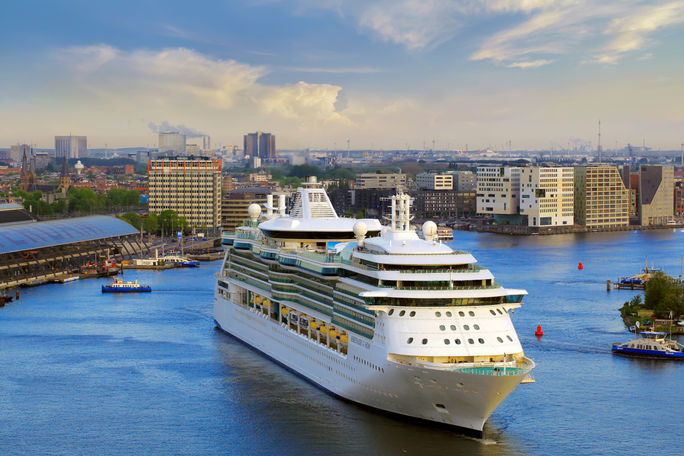Amsterdam
is among the world��s cities that are most notoriously plagued by overtourism
and a battle is already underway to remedy the scourge of overcrowding and
tourism-related nuisance. As part of its next steps, the city council recently revealed
new details of its plans, first announced last year, to ban
large oceangoing cruise ships from docking in the city center. In fact, it
aims to entirely eliminate the cruise port at Veemkade itself by 2035.?
This phased
shutdown of cruise ship operations has now begun, with the municipality recently
announcing
that, starting from 2026, the number of sea cruise ships visiting the Dutch
capital will be nearly halved from 190 to a maximum of 100 per year. The Passenger
Terminal Amsterdam will also immediately revert to a single berth and, from 2027,
all cruise ships will be required to use shore power, reducing emissions while
docked.
Ousting cruise
ships from the city center is part of a broader package of policies that serve local
officials�� aim of curbing the further growth of tourism, and creating a cleaner,
more livable and sustainable urban environment for local residents.
To ensure that it��s
pursuing a responsible approach, the city is adhering to recommendations from
Berenschot, an independent agency that has conducted extensive research into the
potential effects of such changes on various stakeholders, including
representatives from the cruise sector, city and regional authorities, and
government officials.
The anticipated
reduction in cruise ship visits will not only decrease tourist congestion, but
also significantly cut emissions of such pollutants as particulate matter,
nitrogen oxides, sulfur oxides and CO2. The 2027 shore power mandate will
further minimize noise pollution from docked ships.
However, officials
admit, these environmental gains come with economic trade-offs. The imminent reduction
in sea cruise traffic is expected to lower tourist spending at museums,
restaurants, shops and other attractions. This decrease in tourist activity
will also affect fuel sales, as well as reduce revenue from tourist taxes and
port authority shares. The financial implications of this decision are set to be
addressed in the municipality��s upcoming Spring Memorandum, though no immediate
budgetary impacts are expected for 2025.

Royal Caribbean's Serenade of the Seas cruise ship heading to the Passenger Terminal Amsterdam, The Netherlands. (Photo Credit: Adobe Stock/NAN)
Overall, the city
stands to lose anywhere from �46 million to �103 million in revenue, Bloomberg reported. ��We understand that there might be some
adverse effects,�� a city spokesperson said in a statement given to the outlet. ��However,
we also know that visitor numbers continue to rise both worldwide and in
Amsterdam, so we cannot afford to sit back and wait for things to get worse.��?
Does all of this
mean that cruises to the historic Dutch capital as a broader destination will
soon be off the table entirely? That seems unlikely, seeing as the Port
Authority and the province of North Holland are already collaborating with the Ministry
of Infrastructure and Water Management to conduct an official investigation as
to the feasibility of relocating the PTA to the Coenhaven area, approximately
20 minutes from Amsterdam, by 2035
In addition to sea
cruises, the municipality also plans to cut
the number of river cruises to 1,150 annually, down from approximately
2,300, as part of its wider efforts to manage tourist influx, and preserve the
city's character and environment.?
Among the other
measures Amsterdam has implemented in an effort to curb overtourism and
mitigate its effects are new restrictions placed on short-term
rental properties, the banning
of new hotel construction and a ��Stay
Away�� publicity campaign designed to discourage tourists�� typical nuisance
behavior. ??
For the latest travel news, updates and deals, subscribe to the daily TravelPulse newsletter.
Topics From This Article to Explore